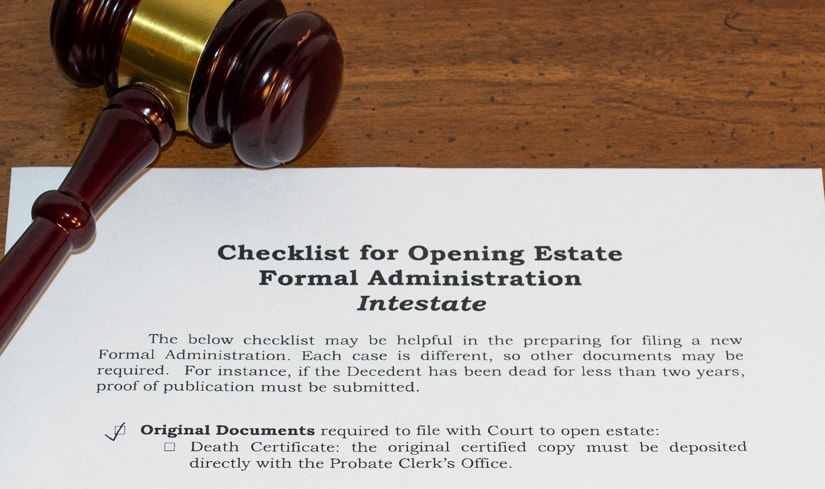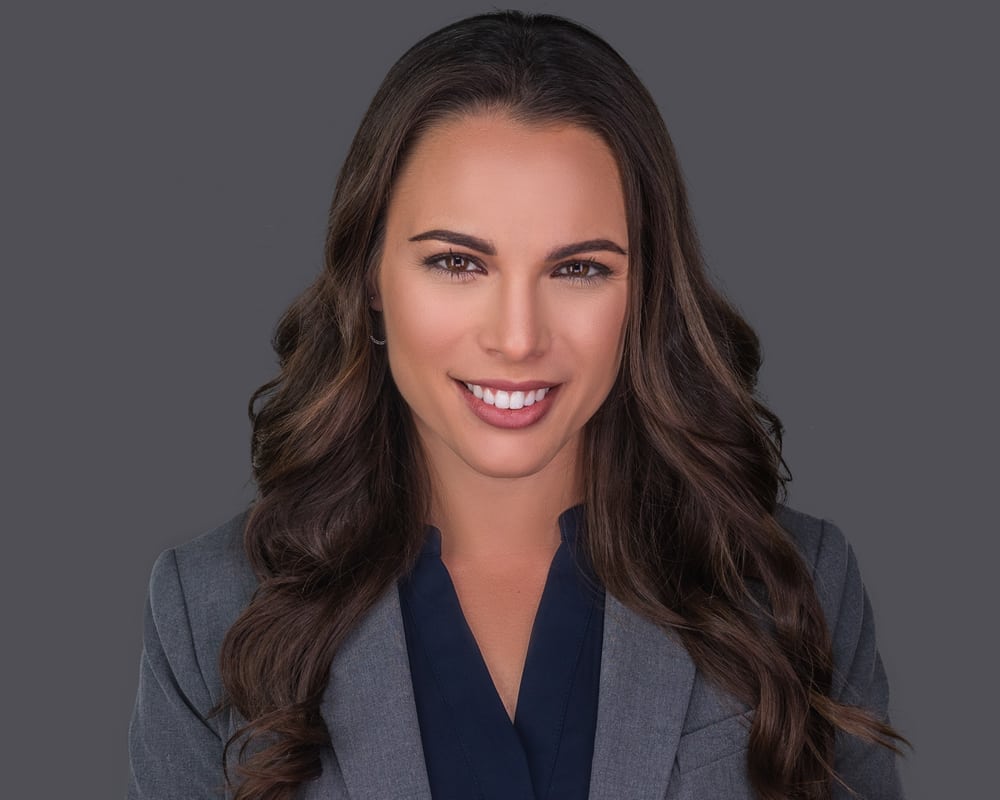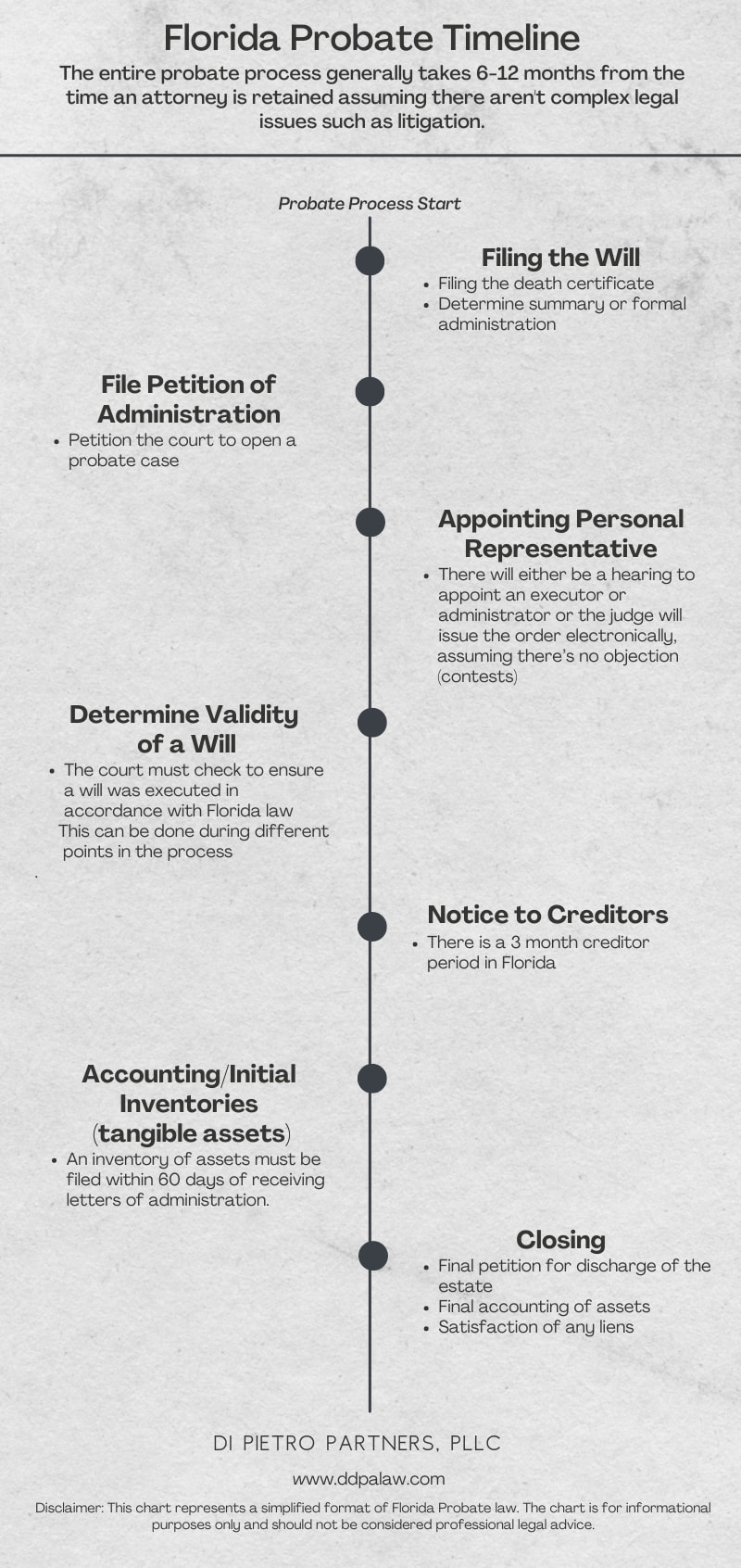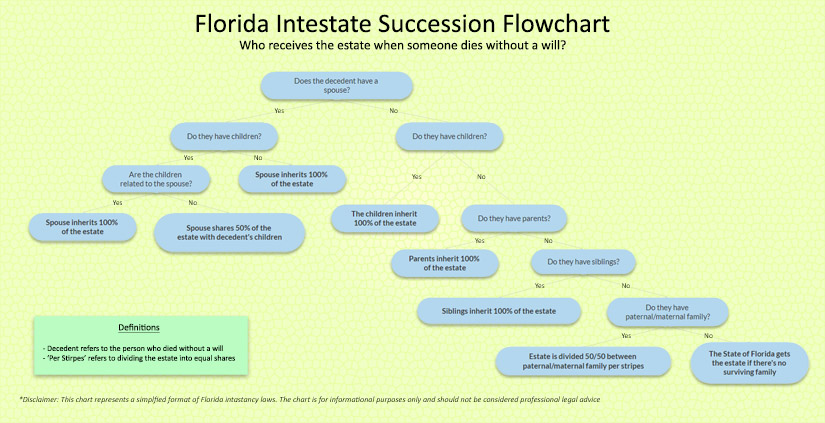Florida Probate Lawyers
Navigating probate after the death of a loved one can feel overwhelming. This is especially true when legal disputes, missing documents, or family tensions arise. At Di Pietro Partners, our Florida probate attorneys help you take control of the process with clarity, confidence, and trusted legal guidance.
Whether you’re a personal representative managing an estate, a beneficiary with questions, or facing a contested will or trust, our team is here to help. We provide statewide representation for probate administration, estate litigation, and complex trust matters. We offer free consultations to help you understand your rights from the start.
Probate Attorney David Di Pietro on National TV
What is Probate?
Probate is the legal process used to transfer assets from a deceased person to their rightful heirs or beneficiaries. It’s supervised by a Florida court to ensure the decedent’s final wishes are honored, debts are paid, and property is distributed properly.
In most cases, wills must go through probate before the court will validate them. If no will exists, Florida’s intestate laws determine who inherits the estate. Probate ensures all legal and financial responsibilities are addressed. This process can be highly time-consuming and complex without proper legal guidance.
There are two primary types of probate in Florida:
Formal Administration:
This is the standard probate process for estates valued at $75,000 or more. It involves multiple court filings, appointment of a personal representative, and often requires legal representation.
Summary Administration:
A simplified process for smaller estates under $75,000 or when the decedent has been deceased for over two years. It’s faster but still requires strict legal compliance.
At Di Pietro Partners, our Florida probate lawyers handle both types of probate statewide. Whether you’re navigating a straightforward estate or facing complex disputes, we help make the process as smooth and stress-free as possible.

Why Hire Di Pietro Partners for Florida Probate?
When a loved one passes away, the legal and financial aftermath can be overwhelming especially if disputes arise or large estates are involved. You need more than a lawyer who files paperwork. You need a seasoned probate team that can resolve complex issues, protect your interests, and, if necessary, win in court.
At Di Pietro Partners, we combine compassionate client service with aggressive courtroom strategy. Whether you’re navigating formal administration, contesting a will, or defending against creditor claims, our attorneys are equipped to guide you through every step of the Florida probate process.
- Decades of Experience in Florida Probate Law
With over 20 years of experience handling probate and estate matters statewide, our firm has resolved thousands of cases from simple filings to multimillion-dollar estate disputes. - Proven Success in Probate Litigation
Unlike many probate lawyers who avoid court, we’re trial-ready from day one. Our team includes former prosecutors and litigators with a track record of success in contested wills, fiduciary disputes, and creditor challenges. - Statewide Representation
With offices in Fort Lauderdale, Miami, Orlando, Tampa, and more, we represent clients across Florida including out-of-state family members managing estates remotely. - Personalized Strategy, Big-Firm Resources
We tailor each strategy to your family’s specific situation while offering the resources and legal firepower of a large litigation firm. - Led by Nationally Recognized Trial Attorney
Founding attorney David Di Pietro has been featured on national media outlets including Fox News, Court TV, and CNBC for legal insight and analysis. His reputation in Florida courts is built on results, integrity, and relentless advocacy.
At Di Pietro Partners, our probate litigation team handles complex estate matters across Florida with unmatched legal skill and courtroom experience. Whether your case involves a contested will, a dispute among heirs, or challenges facing the personal representative, our attorneys are equipped to protect your interests and resolve disputes efficiently-inside or outside of court.
Led by founding attorney David Di Pietro, our team combines decades of litigation experience with deep knowledge of Florida probate law. We routinely represent beneficiaries, executors, personal representatives, and other interested parties in high-value estate disputes.
From Palm Beach to Miami, Orlando to Tampa, we’ve helped families recover millions in inheritance, resolve fiduciary conflicts, and navigate Florida’s often confusing probate process with clarity and confidence.
About Our Florida Probate Team
At Di Pietro Partners, our probate litigation team handles complex estate matters across Florida with unmatched legal skill and courtroom experience. Whether your case involves a contested will, a dispute among heirs, or challenges facing the personal representative, our attorneys are equipped to protect your interests and resolve disputes efficiently inside or outside of court.
Led by founding attorney David Di Pietro, our team combines decades of litigation experience with deep knowledge of Florida probate law. We routinely represent beneficiaries, executors, personal representatives, and other interested parties in high-value estate disputes.
From Palm Beach to Miami, Orlando to Tampa, we’ve helped families recover millions in inheritance, resolve fiduciary conflicts, and navigate Florida’s often confusing probate process with clarity and confidence.
David Di Pietro
Founding Partner
A nationally recognized trial attorney and frequent legal analyst for Fox News, CNBC, and Court TV, David Di Pietro leads our probate litigation practice with over 70 jury trials to his name. Known for litigating some of Florida’s most contested estate matters, David brings extensive knowledge of fiduciary law and has recovered multimillion-dollar outcomes in cases involving contested wills, estate fraud, and breaches of duty by personal representatives.
Nicole 'Niki' Martell
Partner
Niki Martell is a seasoned trial lawyer with over 50 trials and a reputation for strategic, results-driven litigation in probate and guardianship matters. Her background in medical law and elder rights allows her to navigate sensitive family dynamics with both precision and compassion-whether she’s protecting the rights of vulnerable individuals or litigating complex asset disputes.
Rodolfo 'Rudy' Mayor
Partner
Rudy focuses on estate and trust litigation, business disputes, and healthcare fraud. His career includes service at the U.S. Department of Justice and involvement in high-value, high-stakes cases involving inheritance, fraud, and fiduciary disputes. Rudy is known for his calm demeanor, strategic litigation planning, and ability to resolve emotionally charged cases with professionalism and precision.
Florida Probate Process
According to Florida law, after an individual dies, all assets of the decedent must be transferred out of his or her name. Assets that are jointly owned, have a beneficiary designation or that are payable on death, do not have to go through probate. However, all other assets that are titled solely in the decedent’s name must go through this legal process. This can often take between six (6) to twelve (12) months.
his section will provide the basic steps involved with Florida probate. If you’d like a more in-depth summary of this process, here’s an article we wrote on Florida’s probate laws.
1. Filing The Will
The person who’s responsible for the will needs to file the legal document with the Florida Circuit Court within the county which the testor resides in at the time of death. For example, if someone passes away in Fort Lauderdale, they will need to file the will within the Broward County Probate Court.
2. Petition for Administration
Filing a Petition for Administration is the next step involved in this process. This is basically a formal request to probate a will.
3. Personal Representative
The next step is the appointment of a personal representative. This individual is responsible for gathering and distributing assets of the individual who passed away. You can read more about appointing personal representatives and their duties in this article.
4. Determine Validity of a Will
The court must check to ensure a will was executed in accordance with Florida law. That is, the will must be signed, witnessed, notarized, and filed properly and without undue influence.
5. Accounting
The personal representative must account for all assets within the estate. This includes listing all disbursements and providing receipts for necessary transactions. After all assets in the estate are accounted for, notice will be given to all interested parties (i.e. creidors, etc). These interested parties will have 30 days to file a dispute. After these 30 days, the probate court will hold a final hearing to authorize this accounting.
6. Closing
After accounting has concluded, the personal representative will file a final petition for discharge of the estate. Once all assets are distributed and all debts have been taken care of. The court enters an order to finally close the estate.
Florida Probate FAQ
Q. Do all assets go through probate in Florida?
No. Only assets titled solely in the decedent’s name at the time of death typically go through probate. Assets that are jointly owned, have a designated beneficiary (such as life insurance or retirement accounts), or are payable-on-death (POD) or transfer-on-death (TOD) generally bypass probate and pass directly to the named recipient.
Q. How long does probate take?
Three months (90 days) is the general length of time it takes for an estate to go through probate in Florida. This is the typical length of time because the personal representative is legally required to provide creditors 90 days to dispute the estate after notice is provided to the creditors through local newspapers.
This length of time (90 days) is assuming the estate is going through formal probate and that there aren’t any complications during the probate process. Certain factors can influence this length of time dramatically. These factors may include:
High value estates (larger estates may require tax filings)
Challenges to the estate (contested wills, creditor issues, etc.)
Informal Probate (estates valued less than $20,000)
In these cases, the length of time it takes for an estate to go through probate may be increased or decreased depending on the circumstances.
Q. What happens if someone dies without a will in Florida?
When a person dies intestate (without a valid will), their estate is distributed under Florida’s intestacy laws. These laws prioritize close family members in a specific order, starting with the surviving spouse, children, parents, and more distant relatives if necessary. This process can lead to disputes, especially in blended families or where estranged relatives are involved.
Q. How long do you have to file for probate after someone dies in Florida?
Florida law does not set a strict deadline, but it’s best to initiate probate as soon as reasonably possible, ideally within a few weeks to a few months after death. However, if a will is discovered, it must be filed with the clerk of the court within 10 days of learning of the death. Delays can create complications, including asset depreciation, tax penalties, or disputes among beneficiaries.
Q. What assets are exempt from probate in Florida?
Several types of assets may be exempt from probate in Florida, including:
- Jointly owned property with rights of survivorship
- Assets with named beneficiaries, such as life insurance, IRAs, and 401(k)s
- Payable-on-death (POD) and transfer-on-death (TOD) accounts
- Homestead property, which may be exempt depending on family structure and ownership
- Certain personal property exemptions, like household items or vehicles, under Florida law
A probate attorney can help identify exempt versus non-exempt assets specific to your situation.
Q. Do I need a lawyer for probate in Florida?
Yes. Florida law requires most estates to be represented by a licensed attorney. The only exceptions are for very small estates (e.g., assets below the cost of administration) or situations where the executor is the sole beneficiary and no legal complications exist. In nearly all other cases, legal guidance is essential to avoid mistakes, delays, or conflicts.
Q. What does a Florida probate attorney do?
A Florida probate attorney guides families through the legal process of settling an estate after someone passes away. This includes filing court documents, helping the personal representative gather and distribute assets, resolving creditor claims, and handling any disputes over the will or trust. In contested matters, your probate lawyer can represent you in court to protect your interests.
Q. Can a probate lawyer help if there is a dispute between beneficiaries?
Yes. Probate attorneys often handle estate disputes involving contested wills, trust disagreements, or conflicts between beneficiaries. Whether you’re concerned about fairness, undue influence, or trustee misconduct, a skilled probate lawyer can help mediate or litigate the issue in probate court.
Q. Where does probate take place in Florida?
Probate is handled by the circuit court in the county where the deceased person lived. For example, if the person passed away in Miami, the case would be filed in Miami-Dade County Probate Court. A probate attorney can determine the correct venue and ensure all court requirements are met.
Q. Do I need a Florida probate lawyer if I live out of state?
Yes, and it’s actually required in most cases. Even if you’re an out-of-state beneficiary or personal representative, Florida law typically mandates that an attorney licensed in Florida handle the probate process. Our firm regularly works with out-of-state clients and can manage the entire process remotely on your behalf.
Florida Probate By Area
Di Pietro Partners represents clients in probate, trust, and estate matters throughout Florida. With offices across the state, our legal team is able to assist heirs, beneficiaries, and fiduciaries in both contested and uncontested probate proceedings. Whether your case involves a complex inheritance dispute or routine estate administration, we provide experienced guidance tailored to your local court system and procedures.
Fort Lauderdale Probate
Probate matters in Fort Lauderdale and the rest of Broward County are handled by the Broward County Probate Court, part of the Seventeenth Judicial Circuit Court of Florida, located at 201 SE 6th Street, Fort Lauderdale, FL 33301. The Broward County Clerk of Courts manages probate filings, records, and administrative processing, while the judges of the Seventeenth Judicial Circuit preside over hearings and resolve disputes. Our firm is based in Fort Lauderdale and has extensive experience navigating both the Clerk’s office and the courtroom in complex probate and trust litigation. Whether you are a local resident or an out-of-state heir, we are well-positioned to represent your interests in this court system.
Miami Probate
Miami-Dade County Probate Court cases are handled in the Eleventh Judicial Circuit of Florida, which serves all of Miami-Dade County. The main courthouse is located at 175 NW 1st Avenue, Miami, FL 33128, with certain filings and records maintained at the Miami-Dade County Clerk of Courts, 73 W. Flagler Street, Miami, FL 33128. This court system manages both contested and uncontested probate matters, including formal administration, summary administration, and guardianship proceedings. Given Miami-Dade’s size and diversity, many cases involve complex estates with assets in multiple states or countries. Our florida probate lawyers are highly experienced in navigating this court’s procedures to protect our clients’ interests and resolve disputes efficiently.
West Palm Beach Probate
Probate matters in Palm Beach County are handled by the Fifteenth Judicial Circuit of Florida’s Probate Court, located at 205 N. Dixie Highway, West Palm Beach, FL 33401. This court serves residents of West Palm Beach, Boca Raton, Delray Beach, and other cities within the county. Known as one of the wealthiest areas in Florida, Palm Beach County probate cases often involve high-value estates, complex trusts, and multi-jurisdictional assets. Our legal team is well-versed in the court’s procedures and has extensive experience representing beneficiaries, trustees, and personal representatives in both contested and uncontested matters within this circuit.
Fort Myers Probate
Probate matters in Fort Myers and throughout Lee County are handled by the Twentieth Judicial Circuit Court of Florida, which also serves Charlotte, Collier, Glades, and Hendry counties. This court oversees the administration of estates for residents of Fort Myers, Cape Coral, Bonita Springs, and other communities within Lee County. The Lee County Clerk of Court – Probate Division manages case filings, maintains records, and facilitates the probate process. The probate division is located within the Lee County Justice Center at 1700 Monroe Street, Fort Myers, FL 33901. Our Florida probate attorneys are highly experienced in navigating probate matters in this jurisdiction, including both standard administrations and complex, contested estate litigation.
Orlando Probate
Probate matters in Orlando and throughout Orange County are handled by the Ninth Judicial Circuit Court’s Probate Division, which serves both Orange and Osceola counties. This court oversees the administration of estates for residents of Orlando, Belle Isle, Lake Buena Vista, Winter Garden, Winter Park, and other cities within the county. In limited cases where a formal hearing is not required, the Orange County Clerk of Courts may process certain probate filings. Both the court and Clerk’s office are located at 425 N. Orange Avenue, Orlando, FL 32801. Our attorneys regularly represent clients in this court system, guiding them through everything from routine estate administration to complex, contested probate litigation.
Tampa Probate
Probate matters in Tampa and throughout Hillsborough County are handled by the Thirteenth Judicial Circuit Court of Florida, located in the George Edgecomb Courthouse. This court oversees the administration of estates for residents of Tampa, Plant City, Temple Terrace, and other communities within Hillsborough County. The Hillsborough County Clerk of Court & Comptroller’s Office manages probate filings and related services, with its probate division located on the second floor of the courthouse in Room 206. The courthouse is located at 800 E. Twiggs Street, Tampa, FL 33602. Our attorneys are highly experienced with probate cases in this jurisdiction, from straightforward estate administration to high-stakes, contested probate litigation.
Jacksonville Probate
Probate matters in Jacksonville and throughout Duval County are handled by the Duval County Probate Court, part of the Fourth Judicial Circuit Court of Florida, which also serves Clay and Nassau counties. This court oversees the administration of estates for residents of Jacksonville, Jacksonville Beach, Atlantic Beach, Neptune Beach, Baldwin, and other communities within the county. The Duval County Clerk of Courts – Probate Division manages filings, records, and case processing for probate matters. The probate division is located in Room 1173 of the Duval County Courthouse at 501 West Adams Street, Jacksonville, FL 32202. Our attorneys regularly handle probate cases in this jurisdiction, from routine estate administrations to complex and contested probate litigation.
Dying Without a Will in Florida
When someone dies without a valid will, their assets are declared intestate. It’s important to note that “intestate” does not mean that the property now belongs to the State. In fact, Florida has a specific process in determining who receives the decedent’s assets in the absence of a valid will. Here’s a simplified flowchart showing who receives assets when someone passes away without a will in Florida.
- When the decedent has a surviving spouse and has no living children, grandchildren, parents, etc, then the spouse shall receive the entire estate.
- If the decedent has a spouse and also has one or more living family members who are family members of the spouse (i.e children), the spouse shall receive the entire estate.
- If the spouse has additional living immediate family members that are not immediate family of the deceased individual, the spouse shall receive one-half of the estate with the other half going to the spouse’s descendants.
- In cases where the decedent was not married at the time of their passing, the immediate family members will receive the entire estate. The assets will then be divided in accordance with Florida law.
- If the deceased person was not married and also has no living immediate family members, the inheritance will pass to surviving parents of the decedent.
- In cases where someone dies without any surviving close family members, spouses, or relatives, the State of Florida will search for more remote heirs in accordance with intestate law.
The full process can be found in Chapter 732 of The Florida Statutes. This process is very in-depth and often causes confusion/disagreements among beneficiaries. As a result, it’s vital to work with a Florida probate attorney that’s experienced with issues involving intestate succession.
Probate and Trusts

Trusts often intersect with probate in Florida, especially when it comes to managing assets, resolving disputes, and enforcing fiduciary duties. While many trusts are designed to avoid probate, others still require court involvement particularly in cases of mismanagement or contested amendments.
Trust administration involves ensuring that assets are handled and distributed according to the terms set by the settlor (the person who created the trust). Trustees have specific legal duties under Florida law and may be held personally liable for any breaches.
Key trustee responsibilities include:
- Providing annual accountings to beneficiaries
- Paying the settlor’s outstanding debts
- Filing estate or trust tax returns when required
- Acting in good faith and avoiding self-dealing
- Remaining impartial among multiple beneficiaries
- Following Florida and federal laws governing trust administration
When trustees fail to meet these obligations, or when beneficiaries suspect undue influence or financial misconduct, the case may escalate to formal litigation.
Learn more about how our firm handles these cases on our Florida Trust Litigation page.
At Di Pietro Partners, our Florida probate attorneys assist both trustees and beneficiaries with trust administration and litigation. Whether you’re navigating routine duties or facing a legal challenge, we ensure your rights and responsibilities are protected every step of the way.
Contesting a Will in Florida
In some cases, a will can be challenged in court if there’s reason to believe it was created under suspicious circumstances. Florida law allows certain individuals such as heirs, beneficiaries, or creditors to contest a will based on legal grounds such as:
Strict deadlines apply, and these cases require careful legal handling.
Legal Issues & Probate Litigation
After a person passes away, property is often passed along to family members of the deceased. Unfortunately, certain disputes may arise even when the decedent has a solid estate plan in place. For example, issues can occur regarding the actions of the personal representative or the trustee. Further, the prior mental state of the deceased may be called into question. Also, issues may be present with creditors, beneficiaries, etc.
These legal issues ultimately may cause an estate to be formally challenged in court and enter into what’s commonly referred to as probate or estate litigation.
Here’s a list of some common legal issues in probate court.
- Contested Wills
- Disputes Over Trusts
- Issues With Personal Representatives
- Disputes Over Legal Guardianship
- Creditor Disputes
- Removal of a Beneficiary From an Estate
Our law firm has extensive trial experience, particularly, in matters related to probate, estate and trust litigation. We represent beneficiaries, personal representatives, trustees, creditors, or other interested persons throughout Florida.
Nationally Recognized Probate Attorneys with a Reputation for Results
At Di Pietro Partners, our credentials go beyond peer ratings; they’re reflected in courtroom victories, national media appearances, and high client satisfaction across Florida.
Our professional recognitions include:
⭐ Google – 4.8/5.0 (64 Verified Reviews)
Trusted by individuals and businesses across Florida for high-stakes legal representation.
⭐ Lawyers.com – 5.0/5.0 (89 Client Reviews)
Praised for professionalism, responsiveness, and success in complex legal disputes.
⭐ Martindale-Hubbell – 5.0/5.0 (16 Peer Reviews)
Rated by judges and attorneys for ethical standards, trial experience, and legal acumen.
Featured Legal Analyst on National Media
Founding partner David Di Pietro is regularly called upon by networks like Fox News, CNN, CBS, HLN, and Court TV to provide expert legal analysis on complex, high-profile matters involving probate, medical law, and fiduciary disputes.
His commentary and media appearances have included:
- The Britney Spears conservatorship battle
- The Bill Cosby sexual assault case
- Mass litigation involving Johnson & Johnson’s talcum powder and ovarian cancer
These appearances underscore David’s standing as one of Florida’s most respected probate and trial attorneys.
Speak With a Probate Attorney
At Di Pietro Partners, we understand that probate can be overwhelming especially when you’re grieving, navigating family dynamics, or managing high-value estates. That’s why our Florida probate attorneys are committed to making the process as smooth, strategic, and stress-free as possible.
Led by nationally recognized trial lawyer David Di Pietro, our firm handles probate matters of every size and complexity. Whether you’re dealing with routine estate administration or litigating a contested will or trust, we offer trusted legal guidance and aggressive representation when it matters most.
We work with clients throughout Florida, including from offices in Fort Lauderdale, Miami, Orlando, Tampa, West Palm Beach, Fort Myers, and Jacksonville. We also represent out-of-state clients who need to probate or litigate an estate located in Florida.
Your consultation is free. If you’re facing probate, trust disputes, or estate litigation, contact us today to speak with an experienced Florida probate lawyer.









